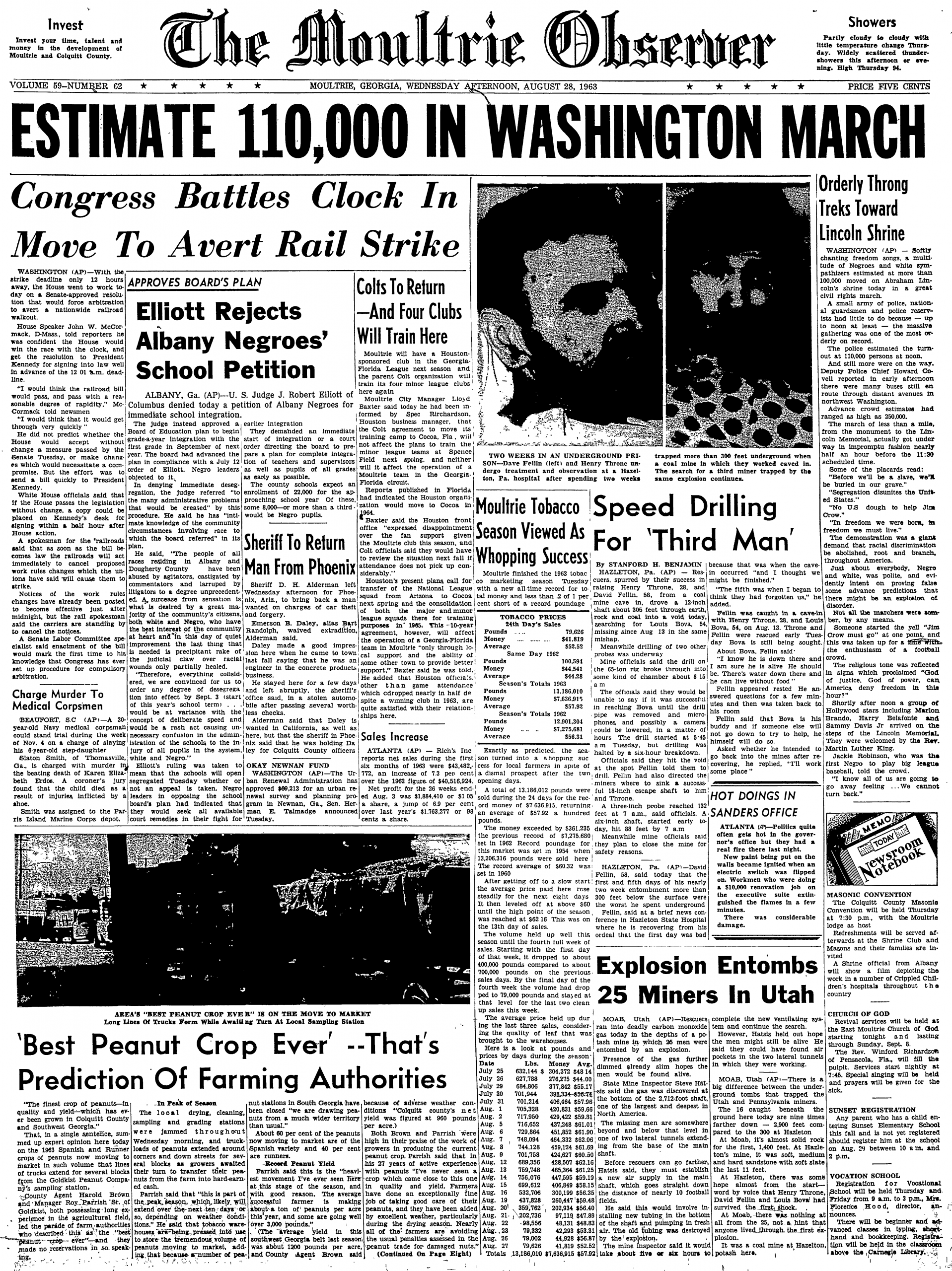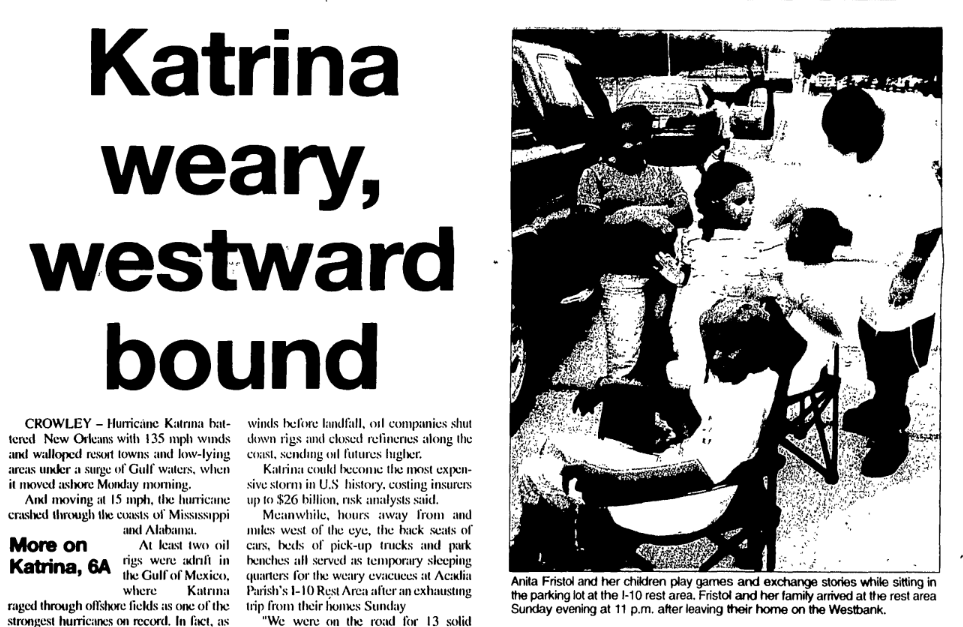Hurricane Katrina was one of the most destructive hurricanes to hit the Gulf Coast in the 21st century. On August 28, 2005, a day before the storm reached Louisiana, it intensified to a Category 5 storm, with sustained winds at times reaching 145 mph. The next day, Katrina brought devastating winds and floods to the streets of New Orleans. Aside from winds that at times reached 100mph, the floods that followed Katrina’s landfall only worsened the damage. In the Crowley Post Signal, published on August 31st, they reported that floodwaters were nearly 20ft deep, and estimated that 80% of New Orleans was underwater. Many were able to evacuate to cities further inland and watched from afar as their city was destroyed. In one article I found, an evacuee was quoted saying, “Let’s hope we have a place to go back to”.
Those who couldn’t evacuate weathered the storm from rooftops and boats, navigating the polluted floodwaters as they prayed for rescue. The damage from Katrina was nearly as large as the storm, killing 1,833 people, causing $161 billion in damage, and leaving millions of people homeless on the Gulf Coast. Luckily, cities like New Orleans have always been resilient, and through the past two decades have rebuilt their lives and homes.

When Prince Charles and Princess Diana got married in the summer sun in 1981, most people wouldn’t have anticipated them getting divorced in the next 15 years. Later, when the two separated in 1992, most wouldn’t assume it would take another 4 years for them to formally divorce. Before the separation, both Charles and Diana began to become involved with other partners outside their marriage. While they attempted to keep their strained relationship out of the public eye, their affairs began to seep through the cracks. They separated in 1992, but Diana continued to perform her royal duties as a princess, and there was no comment regarding divorce from either party. It wasn’t until the queen herself encouraged them that they officially divorced on August 28, 196. The Gazette described the process as a far cry from their extravagant wedding, instead taking 5 minutes in a basement office. While Diana continued to capture the hearts of the world, earning herself the name of the People’s Princess, Charles was not so lucky and faced disapproval from many regarding his new partner. Diana’s newfound freedom was unfortunately short-lived, as she tragically died just a year later in a car accident.
(1945 – 1980s) I Have A Dream: March on Washington, 1963
On August 28, 1963, over a quarter of a million people gathered in Washington, DC for the March on Washington for Jobs and Freedom. Organized by social justice groups like the NAACP, SNCC, and SCLC, this march aimed to advocate for racial justice and civil rights. This is the march when Dr. Martin Luther King Jr delivered his famous “I have a dream” speech. The “Big 6” leaders, including key figures like John Lewis and A. Phillip Randolph, were all in attendance. The Moultrie Observer described the crowd softly singing freedom songs and reciting chants for equal rights. They were happy to report that “just about everybody…was polite” in their march, following the King’s values of peaceful protest. Their voices were heard by politicians in DC, and following the march, work began on civil rights legislation. Less than a year later, the Civil Rights Act of 1964 became law.

On August 25th, 1994, the city of Paris was finally liberated from nazi Germany. After four years of occupation, the people of Paris began to revolt against the fascist regime. What began as a small revolt by Parisians quickly expanded into a larger uprising, which the allied forces were able to capitalize on. Joined by the French 2nd armored division and the US 4th Infantry Division, the citizens of Paris were able to properly push back against their captors. After German Commander Dietrich von Choltitz disobeyed Hitler’s orders to burn down the city, he surrendered to the Allies and ended the occupation. The liberation of Paris was one of many turning points in World War two, as Germany’s power over Europe began to slip. Celebration overtook the streets of Paris, described in the Newark Evening News as a scene that even Hollywood couldn’t match. They also shared a dispatch from Paris that included one man’s firsthand account of the day, describing the parade of Parisians celebrating their liberation.
(1824 – 1914) Suffrage Success: 19th Amendment Signed Into Law, 1920
Signed into law on August 16th, 1920, the 19th Amendment granted women the right to vote. This amendment was a result of decades of activism from women’s suffragists like Cady Stanton and Susan B. Anthony. The movement began long before; most historians attribute its birth to the Seneca Falls Convention in 1848. In the decades after the convention, countless activists faced public scrutiny and even violence while they advocated for a woman’s right to vote. The 19th Amendment finally passed through Congress in 1919 and was signed into law just over a year later on August 26, 1920. The amendment was a groundbreaking advance in women’s rights. On the day it was signed into law, the Hackensack Republican published a speech given by Carrie Chapman Catt, another one of the movement’s leaders. She celebrated the victory of a battle started by the mothers of their generation, applauding their never-ending commitment to the cause. She also encouraged listeners to continue the fight, saying that they shouldn’t stop at the 19th Amendment and instead should continue to advocate for women’s rights.
Join me again next week to discover more of history’s hidden gems and timeless tales.
Explore the “Read All About It” archives to read stories that spotlight our partners and their communities, announcements from our team, updates on current projects, and so much more. Discover articles about engagement, outreach, primary sources, community, digitization, education, and other topics of interest. Delve into the happenings in this week in history and take a deep dive into the events and people who helped shape our communities, our nation, and the world.
Hear Ye, Hear Ye, READ ALL ABOUT IT!
Advantage Archives works to build strong, community-based partnerships to provide free online access to local history, making it discoverable and easily accessible to anyone, anywhere, at any time, on any device. This allows communities to understand and connect to their past in a meaningful way. Through the Community History Archive search platform, we provide the community with the means to explore, discover, learn from, connect with, and share the stories of the people, places, and events that shaped their community.
The Community History Archives are intended to serve as a “portal to the past”, allowing local primary source documents to give an accounting of history as told by the individuals that witnessed it. Advantage Archives guiding principals center around building strong community-based partnerships, which is why we enter into them with the intent of shouldering our fair share, and taking the burden off of the community for the ongoing costs associated with storage, hosting, development, and maintenance of the Community’s History Archive. We are an active participant in the community’s efforts to make their collective history more accessible. The Community History Archives are maintained for free by Advantage and do not require a subscription, seat license, annual support contract, or any other ongoing costs or expenses to the institution or members of the community.
If you would like to see more local history online, please contact your local library, newspaper publisher, genealogical society, historical society, or educational institution, and encourage them to learn more about creating a Community History Archive or have them contact Advantage Archives at (855) 303-2727



